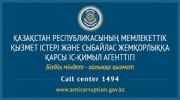- Departments by region
- Astana
- Almaty
- Ulytau Region
- Zhetysu Region
- Шымкент
- Abay region
- Akmola region
- Aktobe region
- Almaty region
- Atyrau region
- East Kazakhstan region
- Zhambyl region
- West Kazakhstan region
- Karagandy region
- Kostanay region
- Kyzylorda region
- Mangistau region
- Pavlodar region
- North Kazakhstan region
- South Kazakhstan region
Date of publication: 26.01.2024 08:29
Date of changing: 26.01.2024 08:31
In the system of current legislation, the statute of limitations for liability is, by its legal nature, an independent legal institution, which differs from such institutions as procedural deadlines and the statute of limitations. The only thing that unites them is the general concept of "term". It follows from this that the statute of limitations is neither a type of procedural time limits nor a type of limitation period. In practice, you can find a situation in which the statute of limitations for administrative liability has expired. Most often, this is due to the fact that an official or a judge did not have time to make a decision in time. In this case, the offender can legitimately avoid a fine, deprivation of rights or other punishment.
In accordance with part 1 of Article 62 of the Code of the Republic of Kazakhstan on Administrative Offenses (hereinafter – the Administrative Code), the following legal grounds are provided for the release of the offender from liability due to the expiration of the statute of limitations:
1) a person is not subject to administrative liability after two months from the date of commission of an administrative offense;
2) a person is not subject to administrative liability after one year from the date of commission of an administrative offense in the region:
- the environment;
- violations of the legislation on rehabilitation and bankruptcy;
3) the above-mentioned terms do not apply to other cases provided for by the current Administrative Code.
In cases where the above-mentioned limitation periods have expired, the judge or an authorized official has no right to impose an administrative penalty and must issue a decision to terminate the case of an administrative offense on the grounds specified in Part 5 of Article 741 of the Administrative Code. According to the legislator, the promptness of the imposition of a penalty should best contribute to the effectiveness of the penalty itself.
According to part 2 of this article, other limitation periods for bringing to administrative responsibility are provided, depending on the sphere of public relations and subjects of administrative responsibility.
An individual is not subject to administrative liability after one year from the date of committing an administrative offense in the field of:
1) anti-corruption legislation;
2) taxation and protection of competition;
3) Customs affairs;
4) legislation of the Republic of Kazakhstan on pension provision;
5) legislation on compulsory social insurance;
6) legislation on energy saving and energy efficiency improvement;
7) legislation on state secrets;
8) legislation on natural monopolies;
9) on subsoil and subsoil use;
10) on the procedure for organizing and holding peaceful assemblies.
A legal entity (including an individual entrepreneur) is not subject to administrative liability after three years from the date of committing an administrative corruption offense, as well as in the field of legislation of the Republic of Kazakhstan:
1) on energy saving and energy efficiency improvement;
2) on subsoil and subsoil use;
3) the procedure for organizing and holding peaceful assemblies;
4) for violation of conformity assessment procedures for technical regulation facilities.
A legal entity (including an individual entrepreneur) is not subject to administrative liability after five years from the date of commission of an administrative offense:
1) in the field of taxation;
2) in the field of competition protection;
3) in the field of customs;
4) in the field of pension legislation;
5) in the field of legislation on compulsory social insurance;
6) legislation on natural monopolies.
The Regulatory resolution of the Supreme Court of the Republic of Kazakhstan dated December 22, 2016 No. 12 clarified some features of the application of the statute of limitations established by the analyzed part of Article 62 of the Administrative Code. Paragraph 15 states that "The limitation period for imposing an administrative penalty for committing administrative offenses in the field of taxation is provided for in part two of Article 62 of the Administrative Code. It is not allowed to calculate the limitation period for imposing an administrative penalty for such offenses in accordance with part three of Article 62 of the Administrative Code."
In accordance with part 3 of Article 62 of the Administrative Code, a two-month period has been established from the date of detection of an administrative offense, after which it is impossible to bring to administrative responsibility if:
1) a continuing administrative offense;
2) when committing an administrative offense in the field of budgetary relations that encroaches on the legally protected interests of society and the state.
The second paragraph of the same part provides for the limitation period for bringing to administrative responsibility in the field of finance from the date of commission of an administrative offense – 3 years, as well as from the date of detection of an administrative offense – 2 months.
The concept of a continuing administrative offense is given in the note of Article 62 of the Administrative Code. Budgetary relations are regulated by the Budget Code of the Republic of Kazakhstan No. 95 dated December 4, 2008. This Code regulates budgetary and inter-budgetary relations, establishes the basic provisions, principles and mechanisms of functioning of the budgetary system, education and use of budgetary funds, as well as issues of formation and use of the National Fund of the Republic of Kazakhstan.
According to Part 4 of this Article, some features of the application of the provisions of Parts 1 and 3 of Article 62 of the Administrative Code are regulated. Firstly, if during the investigation or judicial review of a criminal case it became known that an administrative offense contributed to the criminal offense, the provisions of parts 1 and 3 of article 62 do not apply. Secondly, the court has the right to impose a penalty on a person guilty of such an administrative offense in accordance with the procedure provided for in part 1 of Article 405 of the Code of Criminal Procedure (hereinafter referred to as the CPC). Thirdly, part 1 of Article 405 of the CPC can be applied only on condition that no more than one year has passed since the commission of an administrative offense.
Part 1 of Article 405 of the CPC states that the court, if there are grounds for that, issues a private decision, which draws the attention of state bodies or officials, organizations or their leaders to the facts of violation of the law established in the case, the causes and conditions that contributed to the commission of a criminal offense and require appropriate measures. If an administrative offense is established in the actions of a person that contributes to the commission of a criminal offense, the court has the right to impose a penalty on him provided for by the Administrative Code.
In accordance with part 5 of Article 62 of the Administrative Code, cases of suspension and renewal of the limitation period for imposing an administrative penalty for an administrative offense have been established.
The period of imposition of an administrative penalty for an administrative offense is suspended from the moment:
1) appointment of expertise;
2) making a ruling on the bringing of the person in respect of whom the proceedings are being conducted;
3) referral of the case to the court or to an official of a state body authorized to consider cases of administrative offenses.
The calculation of these terms is resumed from the moment:
1) obtaining the results of the examination;
2) the actual delivery of the person being brought to administrative responsibility to the body (official) executing the definition of the drive.
When suspending the limitation period due to the issuance of a ruling on the drive, it should be borne in mind that the total period of the drive cannot exceed more than one month.
Paragraph 16 of the regulatory resolution of the Supreme Court of the Republic of Kazakhstan dated December 22, 2016 No. 12 clarifies the specifics of calculating the limitation period according to the commented norm. The term for imposing an administrative penalty for an administrative offense in accordance with part 5 of Article 62 of the Administrative Code is suspended from the moment the case is sent to judicial authorities or to an official of a state body authorized to consider cases of administrative offenses. This provision also applies to cases where the case of an administrative offense is not transferred for consideration to another State body under its jurisdiction. The beginning of the suspension of the limitation period is determined by the date of the actual referral of the case to the court or to an official for consideration on the merits (date of delivery to the post office, receipt by courier, date of registration in the register of relevant correspondence, etc.).
Part 6 of the article in question defines the limitation period for bringing to administrative responsibility in the event of termination of a criminal case if there are signs of an administrative offense in the actions of the violator. In this case, the person may be brought to administrative responsibility no later than three months from the date of receipt of the decision to terminate it.
Paragraph 17 of the regulatory resolution of the Supreme Court of the Republic of Kazakhstan dated December 22, 2016 No. 12 clarifies the specifics of calculating the limitation period according to the commented norm. Part 6 of Article 62 of the Administrative Code provides that in the event of termination of a criminal case, if there are signs of an administrative offense in the actions of the violator, the person may be brought to administrative responsibility no later than three months from the date of receipt of the decision to terminate it.
This period for imposing an administrative penalty is calculated from the date of receipt of the decision on termination of the criminal case to the state body authorized to initiate proceedings on an administrative offense.
Part 7 of this Article regulates the procedure for determining the limitation period, if the person being brought to administrative responsibility commits a new administrative offense. In such cases, the time limits for imposing penalties for an administrative offense are interrupted, and the new limitation period for bringing to administrative responsibility should be calculated from the moment a new administrative offense is discovered.
In this case, administrative responsibility should be brought in accordance with the procedure provided for in Part 1 of Article 58 of the Administrative Code. If one person commits two or more administrative offenses, an administrative penalty is imposed for each offense separately.
Part 8 of the article in question establishes the legal grounds and the deadline for reviewing the decision of a judge or an authorized body to terminate administrative proceedings, regardless of the period provided for in part 1 of Article 62 of the Administrative Code, may be reviewed on the proposal of the Chairman of the Supreme Court, the Chairman of the specialized judicial board of the Supreme Court, at the protest of the prosecutor within a year from the date of its entry into force power.
Paragraph 18 of the regulatory resolution of the Supreme Court of the Republic of Kazakhstan dated December 22, 2016 No. 12 clarifies the specifics of the termination of an administrative case due to the expiration of the statute of limitations. Upon termination of proceedings on an administrative offense in connection with the expiration of the limitation period for bringing to administrative responsibility (subclause 5) part 1 of Article 741 of the Administrative Code), courts, by virtue of subclause 6) part 1 of Article 822 of the Administrative Code, should indicate in the resolution all the circumstances established during the consideration of the case, as well as conclusions about guilt or innocence persons in the commission of an offense. These circumstances are important in resolving the issue of compensation for damage caused by an offense, and by virtue of part 5 of Article 76 of the CPC, they are not proved again when considering a case on the civil consequences of the same offense committed by this person.
The circumstances recognized by the court as well-known do not need to be proved. Circumstances that are not included in the subject of evidence in the case due to their widespread popularity in a certain territory, including to the court and persons involved in the case, are generally known.
The note to the article in question gives the concept of continuing offenses. Such offenses are characterized by the continuous implementation of a single composition of a certain act provided for in the article of the Special Part of this section, and has not been completed by the time it is discovered.
In case of a continuing administrative offense, the limitation period begins to be calculated from the date of detection of the administrative offense.




























